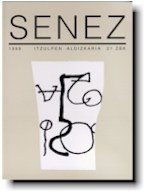Senez 21 (1999)
- Date of publication: 1999
- ISSN: 84-7086-287-1
- L.D.: SS 761/99

- 132 pp.
All articles in this issue have been published in Basque.
Presentation
Translation: Juan Mari Mendizabal
Together with this issue comes a new chief editor. Those of us who have assumed the new task will have to work hard so as to maintain the enthusiasm and high standards established by Koldo Biguri. Apart from the occasional amateur translation which was undertaken between friends (amateur is a nice word, if we take it in strict sense: translation lovers — and that is what the forerunners of our association were), Koldo Biguri and his staff team have left us a solid professional magazine rooted in the heart of the profession of Basque translators. We hope not to disappoint those who preceded us and those who will come after us...
A translation magazine needs translations, and that is what we would like to bring continually to these pages, texts that any of our translators might have produced and that have not been published. Over the last few years, we have had little place for poetry, and there are many who say that verse has become obsolete: some say that nowadays there is no place for poetry — we say, more precisely, that there is no time for reading poetry. Juan Garzia's translation of some poems by good old Bob Dylan makes us look back, that is, puts us in a special position to see the future. This is verse, metred speech, and most of the poems are measured indeed — both in syllables and rhyme, and as regards heartbeat. These are poems for singing, real singing, as well translated poems meant for singing.
Then come two sharp essays on the right use of language or, as they would say in current neat neo-Basque, the 'linguistic quality', though written from different approaches. On one hand, the article by Karlos del Olmo is an attempt at explaining the origin, modes and reasons for some sources of present bad language use, and offers clear solutions to stop the flood of Spanish-influenced speech. On the other hand, young translators Idoia Ormaetxea and Maider Ziaurriz expose the poor language that students going through their education fully in Basque have to endure in many textbooks. We might add, with a bit of pride, that both of them have just completed the Master in Translation at the University of the Basque Country and that, in their work, they have shown that, once passed the theoretical studies, they have grasped the translator's pragmatic intuition very well indeed.
Not far from the problems related to the pragmatics of translation, Juan Garzia sheds some light on the slippery, hesitant and unregulated field of punctuation systems, by proposing, if not definitive solutions, directions and specific problem solvers.
When they started translating Ismail Kadare's 'The File On H', Juan Mari Arzallus and Antton Olano did not foresee that Kosovo would often be on the front page of all newspapers, and unfortunately, not precisely due to literature or translation-related news. This article is undoubtedly a contribution impregnated with current events.
The paper by Gotzon Egia focuses on more theoretical fields, dealing with the faithfulness/treason concept that has been a central point of translation since the downfall of the Babel tower.
Finally, we publish one of those fine conversations that we put on paper once in a while, when we have the chance, the participants being none less than Anjel Lertxundi, one of the most fertile Basque authors, and Jorge Gimenez Bech, translator and publisher. It contains memorable passages that help a better understanding of the translation process. It is one of those readings from which you learn more than from five grammars and innumerable dictionaries!
And, last but not least, this issue of Senez brings a novelty: prior to distributing the paper magazine, an electronic edition will be available on the Internet, on EIZIE's web page. We hope to keep doing so in the future as well.



